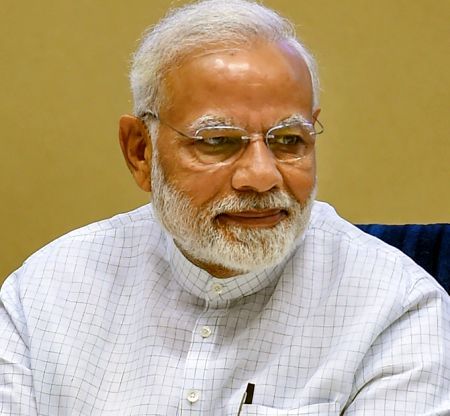 Prime Minister Narendra Modi on Tuesday stressed the need to ensure that the quest for material prosperity does not compromise the environment and said India’s experience shows that development may not come at the cost of its green assets.
Prime Minister Narendra Modi on Tuesday stressed the need to ensure that the quest for material prosperity does not compromise the environment and said India’s experience shows that development may not come at the cost of its green assets.
Chairing the plenary session of an event to celebrate the World Environment Day 2018, being hosted by India, he said India’s traditions have for long underlined the importance of living in harmony with nature.
“We are committed to raising the standards of living of our people and do it in a way that is sustainable and green,” he said.
With the theme of the WED 2018 being ‘Beat Plastic Pollution’, Modi noted that the menace was already having a deadly impact on India’s marine ecosystem and marine litter, especially micro-plastic, was a major trans-boundary problem.
“India is preparing to join the ‘Clean Seas Campaign’ and make its contribution towards saving our oceans,” he said.
Modi said while much of the world focuses on the “inconvenient truth”, India has moved on to “convenient action”.
He also reiterated India’s commitment to sustainable development.
“Let us all join together to beat plastic pollution and make this planet a better place to live. The choices that we make today, will define our collective future. The choices may not be easy. But through awareness, technology, and a genuine global partnership, I am sure we can make the right choices,” he said.
The prime minister asserted that plastic now threatens to become a menace to humanity and a lot of it never makes it to the recycling bin while what was worse was that a lot of it was non bio-degradable.
He also pointed out that plastic pollution was now entering into the food chain and micro plastics had even entered basic things such as salt, bottled water and tap water.
Noting that the per capita plastic consumption in India was much lower than in many parts of the developed world, he said India’s national mission on cleanliness and sanitation -- Swachh Bharat Abhiyan -- has a special focus on “plastic waste management”.
Modi said that it was the call for ‘convenient action’ that led India, along with France, to form the International Solar Alliance which is perhaps, the single most important global development, towards the cause of environment, after the Paris Conference.
“About three months ago, leaders from over 45 nations, and Heads of International Organisations, gathered here in New Delhi, for the Founding Conference of the International Solar Alliance. Our experience shows that development can be environment friendly. It need not come at the cost of our green assets,” he said.
He said environmental degradation hurts the poor and vulnerable the most and asserted that it is the duty of every person to ensure that “the quest for material prosperity does not compromise our environment”.
Asserting that as part of the Nationally Determined Contributions, India is committed to reducing thirty-three to thirty-five per cent of emission intensity of its GDP during 2005 to 2030, the prime minister said, “We are on track to meet the 2030 NDC”.
He said according to the UNEP Gap Report, India is also on track to meet its ‘Copenhagen Pledge’ and the country will reduce the emissions intensity of India’s GDP by twenty to twenty-five per cent over the 2005 levels by 2020.
“We have a robust National Biodiversity Strategy. With only two point four per cent of the world’s land area, India supports seven to eight per cent of the recorded species diversity. At the same time, India supports nearly 18 per cent of human population.
“Our tree and forest cover has also increased by one per cent in the last two years. We have also done well in the field of wildlife conservation. The population of tiger, elephant, lion rhino and other forms of wildlife is on the rise,” he said.
Asserting that India’s traditions have for long stressed the importance of living in harmony with nature, he said this was reflected in the reverence of the elements of nature.
“It is reflected in our festivals, and in our ancient texts,” he said.
Noting that India is the fastest growing economy in the world today, he said, “We are committed to raising the standards of living of our people. We are also committed to ensure, that we do so, in a way that is sustainable and green.”
He pointed out that the government has given forty million new cooking gas connections in the last two years, while over three hundred million LED bulbs were installed across India which have saved electricity and prevented additional amounts of carbon dioxide from being released into the atmosphere.
He said India has targeted generation of 175 GW of solar and wind energy by 2022.
“We are already the fifth largest producer of solar energy in the world and also the sixth largest producer of renewable energy,” he said.
Modi said the government aims to provide an electricity connection to every household, which will further reduce dependence on environmentally degrading forms of fuel.
He said to generate employment, the government was working towards making India a global manufacturing hub for which it launched the Make in India campaign.
“We also recognise the need to tackle the issue of water availability, which is becoming a major challenge in India, which is why we have launched the massive Namami Gange initiative.
“This programme, which has already started giving results, will soon revive the Ganga, our most precious river,” he said.











 © 2025
© 2025